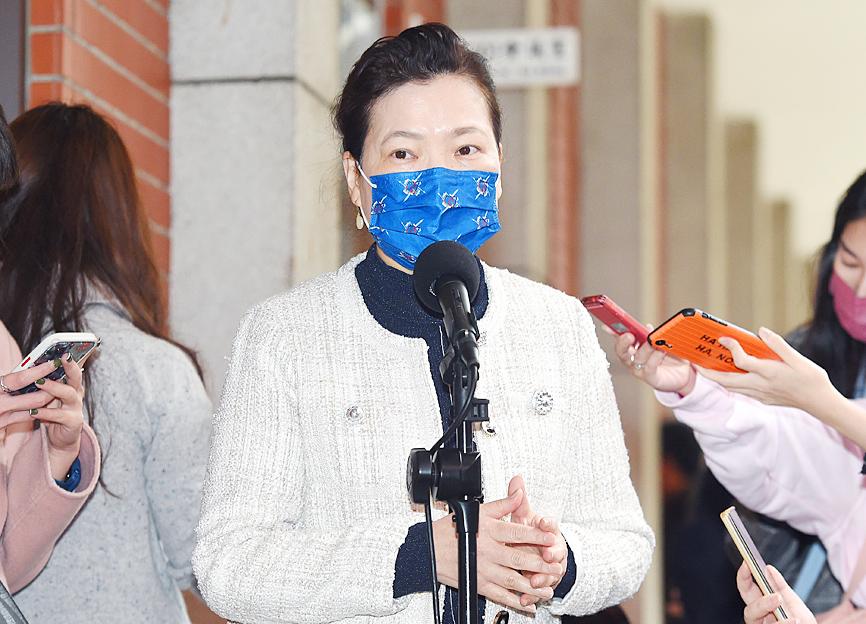A lockdown to contain a surging COVID-19 outbreak in Shanghai, where many Taiwanese companies have operations, could affect their shipments, Minister of Economic Affairs Wang Mei-hua (王美花) said yesterday.
Speaking with reporters on the sidelines of a meeting of the legislature’s Economics Committee, Wang said the Industrial Development Bureau had contacted Taiwanese firms in Shanghai to better understand the fallout from the lockdown.
Wang said that the companies’ operations had not been disrupted, but there are concerns that shipments could be affected.

Photo: Liao Cheng-hui, Taipei Times
Shanghai authorities on Sunday introduced a phased lockdown, with citywide testing to commence as the city reported a new high of about 3,500 infections on that day.
In the first phase, areas east of the Huangpu River began a lockdown and mass testing from yesterday until Friday. In the second phase, areas west of the river are to be under lockdown and undergo testing from Friday until Tuesday next week.
During the lockdowns, public transportation is suspended, with unapproved vehicles not being allowed on the roads, and non-essential businesses being closed. People are required to stay at home.
Materials Analysis Technology Inc (閎康科技), which runs a laboratory for a wide range of testing — such as material analysis, reliability analysis and failure analysis — said that deliveries from its Shanghai subsidiary would be postponed until the end of the phased lockdown.
To compensate for delays, the company is reallocating its global production while keeping in close contact with clients and suppliers regarding the lockdown.
The company has put essential measures in place to ensure its employees’ health and safety in Shanghai, it said.
Silicon wafer supplier Wafer Works Corp (合晶科技) said that it expects shipments to be affected by the lockdowns, although production remains normal at its Shanghai site.
Contract chipmaker Taiwan Semiconductor Manufacturing Co (TSMC, 台積電) said the lockdowns are unlikely to affect production at its fab in Shanghai, adding that the company plans to follow the city’s COVID-19 prevention guidelines.
TSMC runs an eight-inch wafer fab in Shanghai’s Songjiang District.
IC packaging and testing services provider ASE Technology Holding Co (日月光投控) said the restrictions on movement are expected to raise the logistics costs of subsidiary Universal Scientific Industrial (Shanghai) Co (USI, 環旭電子).
USI plans to spend more to take care of its employees in the city while abiding by rules imposed by Shanghai health authorities, ASE said, adding that it expects the measures to have limited effects on its sales.
USI operates several plants in the Zhangjiang Hi-Tech Park in Pudong to provide tailored systematic production solutions for smart wearable device suppliers.

Nvidia Corp chief executive officer Jensen Huang (黃仁勳) on Monday introduced the company’s latest supercomputer platform, featuring six new chips made by Taiwan Semiconductor Manufacturing Co (TSMC, 台積電), saying that it is now “in full production.” “If Vera Rubin is going to be in time for this year, it must be in production by now, and so, today I can tell you that Vera Rubin is in full production,” Huang said during his keynote speech at CES in Las Vegas. The rollout of six concurrent chips for Vera Rubin — the company’s next-generation artificial intelligence (AI) computing platform — marks a strategic

REVENUE PERFORMANCE: Cloud and network products, and electronic components saw strong increases, while smart consumer electronics and computing products fell Hon Hai Precision Industry Co (鴻海精密) yesterday posted 26.51 percent quarterly growth in revenue for last quarter to NT$2.6 trillion (US$82.44 billion), the strongest on record for the period and above expectations, but the company forecast a slight revenue dip this quarter due to seasonal factors. On an annual basis, revenue last quarter grew 22.07 percent, the company said. Analysts on average estimated about NT$2.4 trillion increase. Hon Hai, which assembles servers for Nvidia Corp and iPhones for Apple Inc, is expanding its capacity in the US, adding artificial intelligence (AI) server production in Wisconsin and Texas, where it operates established campuses. This

SEMICONDUCTORS: The German laser and plasma generator company will expand its local services as its specialized offerings support Taiwan’s semiconductor industries Trumpf SE + Co KG, a global leader in supplying laser technology and plasma generators used in chip production, is expanding its investments in Taiwan in an effort to deeply integrate into the global semiconductor supply chain in the pursuit of growth. The company, headquartered in Ditzingen, Germany, has invested significantly in a newly inaugurated regional technical center for plasma generators in Taoyuan, its latest expansion in Taiwan after being engaged in various industries for more than 25 years. The center, the first of its kind Trumpf built outside Germany, aims to serve customers from Taiwan, Japan, Southeast Asia and South Korea,

Garment maker Makalot Industrial Co (聚陽) yesterday reported lower-than-expected fourth-quarter revenue of NT$7.93 billion (US$251.44 million), down 9.48 percent from NT$8.76 billion a year earlier. On a quarterly basis, revenue fell 10.83 percent from NT$8.89 billion, company data showed. The figure was also lower than market expectations of NT$8.05 billion, according to data compiled by Yuanta Securities Investment and Consulting Co (元大投顧), which had projected NT$8.22 billion. Makalot’s revenue this quarter would likely increase by a mid-teens percentage as the industry is entering its high season, Yuanta said. Overall, Makalot’s revenue last year totaled NT$34.43 billion, down 3.08 percent from its record NT$35.52